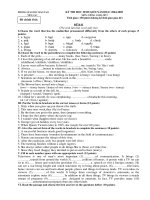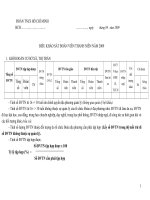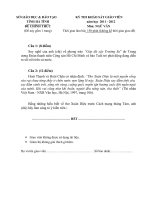khao sat giao vien
Bạn đang xem bản rút gọn của tài liệu. Xem và tải ngay bản đầy đủ của tài liệu tại đây (56.07 KB, 3 trang )
Phòng giáo dục đào tạo Kỳ thi học sinh giỏi năm học 2004-2005
Yên Lạc Môn: Tiếng anh lớp 9
Thời gian: 150 phút (không kể thời gian giao đề)
Đề bài
(Thí sinh làm bài ra tờ giấy thi)
I.Choose the word that has the undderline pronounced differently from the others of each groups (5
points).
1. a. hurry b. hurt c. turn d. excursion
2. a. pub b. lamb c. limb d. climb
3. a. fool b. boot c. blood d. noodle
4. a. glass b. class c. grass d. mass
5. a. things b. airports c. suitcases d. calculators
II.Choose the word in the parentheses to complete the following sentences (15 points)
1. Each of the girls .many books. (has / have / having / to have).
2. I love this painting of an old man. He has such a beautiful smile.
(childhood / childish / childless / childlike)
3. I never wear yellow because It doesnt .. me. (match / fit / like / suit)
4. Always ..honest in whatever you do (tobe / be / being / are).
5. If we use her house, we must pay the ..(fee / fare / rent / tip).
6. A prisoner this morning.(is hanged / is hung / was hanged / was hung)
7. Scientists are doing their research work in the ..
(museum / office / library / laboratory)
8.The Browns have moved into a huge
(two storey house / house of two storey / two storeys house / house two - storey)
9. In pain as a result of the fall, he .. ..slowly home
(stepped / wound / limped / sped)
10. I think hes unwell, he was complaining .. a headache this morning.
(at / of / from / against)
III. Put the Verbs in brackets in the correct tenses or forms (15 points)
1. Only when you grow up,you (know) the truth.
2. This time next week,they (fly) to France
3. By the time you got to the party, they (prepare) everything.
4. I hope she (be) pretty when she (grow) up.
5. I wonder what (happen) there since we (leave).
6. George (go) on holiday every two years.
7. When Queen Victoria (die) in 1901, she (reign) for over 60 years.
IV. Give the correct form of the words in brackets to complete the sentences (10 points).
1. A successful business needs good (organize)
2. There have been many (wonder) developments in the field of (communicate)
3. Noone can measure the (deep) of this river.
4. After the explosion, only two people were left (live)
5. The meeting finishes without a single (agree).
6. She always orders other people to do things.She is (boss) so I (like) her .
7. Since they lived (happy) they decided to put an end to their (marry)
V. Fill in each number space with one appropriate word. (15 points)
Television is one of mans most important (1) .of communication. It brings (2)
,sounds from around the world (3) millions of homes. A person with a TV set can
sit in (4) house and watch the president (5) a speech or visit a foreign country. He
can see a war being fought and watch statesmen try to bring about peace. (6) television,
home viewers can see and learn about people, places and things in faraway lands. TV even takes its
viewers (7) . of this world. It brings them coverage of Americas astronauts as the
astronauts explore outer (8) . In addition to all these things, TV brings its viewers a steady
stream of programs (9) .are designed to entertain. In fact, TV provides many (10)
.entertainment programs than any other kinds.
VI. Read the passage and choose the best answers to the questions bellow (10 points)
Đề chính thức
After inventing dynamite, Swedish – born Ajfred Nobel became a very rich man. Nobel
prefered not to be remembered as the inventor of dynamite, so in 1895, just 2 weeks before his
death, he created a fund to be used for awarding prizes to people who had made worldwhile
contributions to mankind. Originally there were five awards: literature, physics, chemistry, medicine
and peace. Economics was awarded in 1968, just sixty seven years after the first awards ceremony.
Nobel’s original legacy of nine million dollars was invested and the interest on this sum is
used for awards which vary from $30,000 to $ 125,000.
Every year on Dec 10
th
, the anniversary of Nobel’s death, the awards are presented to the
winners. No awards were presented from 1940 to 1942 at the beginning of world war II. Some
people have won two prizes but this is rare. Others have shared their prizes.
1. When did the first award ceremony take place?
a. 1895 b. 1901 c. 1962 d. 1968
2. In how many fields are prizes presented?
a. 2 b. 5 c. 6 d. 10
3. Why was the Nobel prize established?
a. to recognize worldwhile contributions to humanity.
b. to honor the inventor of dynamite.
c. to spend money
d. to prevent wars
4. Which of the followings is Not true?
a. Awards vary in monetary value.
b. Ceremonies are held on Dec 10
th
to commemorate Nobel’s invention.
c.No awards were given when the world war II began.
d. A few individuals have won two awards
VII. Rewrite the following sentences in such a way that its meaning remains unchanged (15 points)
1. My father used to play football when he was young
-> My father doesn’t .…………………………………
2. What a shame you didn’t tell me earlier
-> If only………………………………………………
3. That’s an insulting name to use for him
-> Don’t call……………………………………………
4. She liked Paris very lilthe and Rome less.
She thought Rome……………………………………
5. I took little notice of the man standing at the gate.
I didn’t pay ……………………………………………
6. No, please don’t tell him.
I’d rather………………………………………………
7. “We should try that new place for dinner ” said Bill.
Bill suggested ..………………………………………
8. The worker only called off the strike after a new pay offer.
Only after……………………………………………
9. I can meet you if you arrive before eleven.
So .……………………………………………………
10. I don’t really like her, even though I admire her achievement.
Much…………………………………………………
VIII. Use the given cues to make the meaningful sentences for the following letter (15points).
Dear Mrs Philips,
1. I/ see/ your advertisement/ today’s “Cambridge News”.
2. I/ like/ apply/ job/ look/ your two children/ mornings.
3. At present, I/ be/ student/ local Technical College / I/ study/ English part- time.
4. Although I/ be/ only twenty years old, I/ have/ lot/ experience/ caring/ children.
5. I have brothers/ sisters/ younger/ myself/ last year I/ work/ London/ Mother’s Help/ ten months.
6. During/ time, I/ be/ responsible/ three - year - old boy/ his mother/ be/ work.
7. If you/ think I/ be/ suitable,please ring me/ 72386/ we can arrange/ time/ meet.
8. The best time / call / be/ 6 pm.
9. I/ be/ always/ home/ that time.
10. I look forward/ talk/ you
Your sincerely,
Antoinette.
The end
Híng dÉn chÊm ®Ò thi häc sinh giái líp 9 n¨m häc 2004-2005
M«n: TiÕng anh
I. (5 ®iÓm) 1®/ 1 c©u ®óng:
1. a. 2.a 3.c 4.d 5.b
II. (15 ®iÓm) 1,5®/ 1 c©u ®óng:
1. has 6. was hanged.
2. childlike 7. laboratory
3. suit 8. two - storey house
4. be 9. limped
5. rent 10.of
III. (15 ®iÓm) 1,5®/ 1 chç ®óng:
1. will .. know… 5. has happened/ left.
2. will be flying 6. goes
3. had prepared 7.died/ had reigned
4. will be/ grows (up).
IV. (10 ®iÓm) 1®/ 1 tõ ®óng:
1. organization 5. disagreement
2. wonderful/ communication 6. bossy/ dislike
3. depth 7. unhappily/ marriage
4. alive
V. (15 ®iÓm) 1,5®/ 1 c©u ®óng:
1. means 6. Through
2. pictures 7. out
3. into 8. space
4. his 9. which/ that
5. make 10. more
VI. (10 ®iÓm) 2,5®/ 1 c©u ®óng:
1.b. 2.c. 3.a. 4.b.
VII. (15 ®iÓm) 1,5 ®/ 1 c©u ®óng:
1. My father doesn’t play football any more
2. If only you had told me earlier.
3. Don’t call him by such an insulting name.
4. She thought Rome was (even) worse than Paris.
5. I didn’t pay much attention to the man standing at the gate.
6. I’d rather you didn’t tell him.
7. Bill suggested trying that new place for dinner.
8. Only after a new pay offer did the workers call off the strike
9. So long as you arrive before eleven I can meet you.
10. Much as I admire her achievement, I don’t (really) like her.
VIII. (15 ®iÓm) 1,5®/ 1 c©u ®óng:
Dear Mrs Philips,
1. I have seen/ saw your/ the advertisement in today’s “Cambride News”.
2. I’d like to apply for the job (of) looking after your two children in the mornings.
3. At present, I am a student at the/ your/ a/ my local Technical College where.
I study/ am studying English part - time.
4. Although I am only twenty years old I have lots/ a lot of experience in/ of caring for children.
5. I have brothers and sisters who are younger than myself and last year I worked in London as a
Mother’s Help for ten months.
6. During that time I was responsible for a three year - old boy when/ while his mother was working
(at work).
7. If you think I am/ would be/ suitable, please ring me on 72386 so that/ and/ we can arrange a time
to meet.
8. The best time to call is at 6 pm.
9. I am always at home at that time.
10. I look forward to talking to you (then).
Your sincerely,
Antoinette









